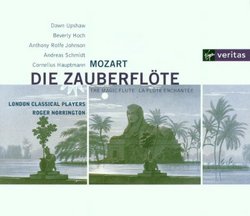| All Artists: Wolfgang Amadeus Mozart, Dawn Upshaw, Beverly Hoch, Anthony Rolfe Johnson, Andreas Schmidt, Cornelius Hauptmann, Roger Norrington, London Classical Players, Olaf Bär, Guy de Mey Title: Mozart: Die Zauberflöte / Upshaw, Hoch, Rolfe Johnson, A. Schmidt, Hauptmann, Bär; Norrington Members Wishing: 0 Total Copies: 0 Label: EMI Import Release Date: 2/9/1999 Album Type: Limited Edition, Import Genre: Classical Styles: Opera & Classical Vocal, Historical Periods, Classical (c.1770-1830) Number of Discs: 2 SwapaCD Credits: 2 UPC: 724356138421 |
Search - Wolfgang Amadeus Mozart, Dawn Upshaw, Beverly Hoch :: Mozart: Die Zauberflöte / Upshaw, Hoch, Rolfe Johnson, A. Schmidt, Hauptmann, Bär; Norrington
 | Wolfgang Amadeus Mozart, Dawn Upshaw, Beverly Hoch Mozart: Die Zauberflöte / Upshaw, Hoch, Rolfe Johnson, A. Schmidt, Hauptmann, Bär; Norrington Genre: Classical
|
Larger Image |
CD Details |
CD ReviewsExcellently cast Magic Flute with rapid tempi Leslie Richford | Selsingen, Lower Saxony | 01/09/2005 (5 out of 5 stars) "In his accompanying essay to this edition of ?Die Zauberflöte? (The Magic Flute), Peter Branscombe reaches two conclusions, one of which I can wholeheartedly agree with, the other of which I find to be all too positive. After exploring the avenues and sources which led Emanuel Schikaneder to put together his libretto, he states baldly, ?Certainly, there are minor inconsistencies, but once one has grasped that it is through and with the hero that one experiences the events [?], the story offers little in the way of difficulties.? Here I beg to differ. The plot of this ?opera? (I would as gladly have said ?musical?) is, to my mind, thoroughly illogical and confused and is only held together by the threadbare love-story between Tamino and Pamina, although there appears to be no motivation behind that either. It is, in fact, surely only Mozart?s grandiose music and the brilliant stage fireworks which make this piece so popular.
Branscombe?s second conclusion, however, is perfectly in order: ?[?] Notwithstanding the solemnity of some of the temple scenes, ?Die Zauberflöte? was conceived and performed by Mozart and Schikaneder as a swiftly-moving drama. Everyone involved in this recording would surely agree that that is how it makes its most vivid and magical effect.? Roger Norrington and his period-instrument ensemble make sure that this performance never gets bogged down, there is always fast-moving action and transparent-as-glass playing; and the excellent soloists and choir (whose texts are, for an English ensemble, incredibly well pronounced, I might add) ensure that there is never a dull moment. The quality of the singing and of the spoken roles is, in my humble opinion, first-rate (although I have never had the opportunity to compare this recording with any other version): Beverly Hoch is a delightful Queen of the Night who achieves the high notes in her arias with absolute ease and sovereignty. Dawn Upshaw is a charming but woe-begone Pamina. The male roles are equally well cast, with a superb Anthony Rolfe-Johnson as Tamino, Cornelius Hauptmann as Sarastro and Andreas Schmidt as the comic figure Papageno. I particularly enjoyed Guy de Mey as Monostatos; Olaf Bär and Catherine Pierard (as Papagena) have a comparatively minor part to play but are thoroughly convincing. The groups of three (ladies, boys, priests and slaves) are quite brilliantly done: I thought the idea of employing three well-known early-music sopranos (Tessa Bonner, Evelyn Tubb, Caroline Trevor) as the three boys worked really well, their voices having just the right mixture of innocence and maturity. Sarastro?s lions are played by real lions from London Zoo! The recording was made at London?s prestigious Abbey Road studio in December 1990 and is technically satisfying. The microphones are placed at a certain distance from the singers, creating something of a stage effect. The only slight disadvantage is the difference in dynamic between some of the spoken asides and the really loud passages: after adjusting the volume to hear the spoken dialogue comfortably, my ears were nearly blasted by the noise (chord and thunderclap) at the first appearance of the Queen of the Night. Here it is perhaps not only one?s ears but also one?s loudspeakers that are in danger. The booklet contains the complete libretto in German and English, but unfortunately offers no information whatsoever about the members of the ensemble nor about the instruments used. " |

 Track Listings (27) - Disc #1
Track Listings (27) - Disc #1